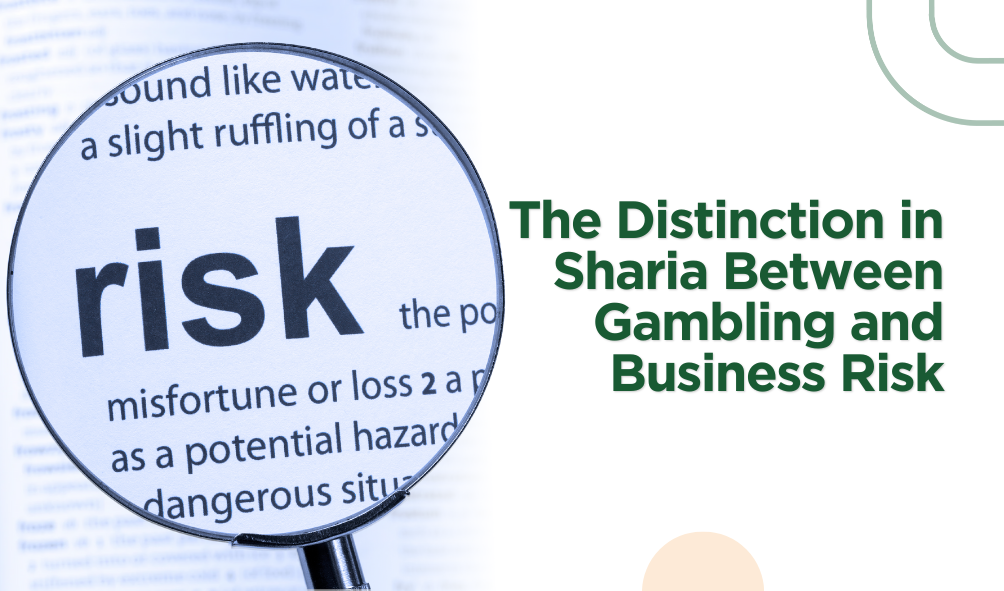The Distinction in Sharia Between Gambling and Business Risk
Ethical financial transactions in Islamic economics are based on the distinction between haram (prohibited) and halal (permissible) business practices. A crucial component of this distinction is being aware of the basic distinctions between gambling which is strictly forbidden by Sharia law and business risks such as those found in legal commercial endeavors. In order to analyze these distinctions this article focuses on Sharia law which is backed by Hadith Quranic verses and academic interpretations.
Being aware of business risk in halal trade
Taking part in legal trade and entrepreneurship entails a certain amount of risk. As long as it complies with moral and ethical standards Islam promotes constructive economic activity. The Quran emphasizes in the following verse that trade is acceptable.
“But Allah has permitted trade and has forbidden interest.”
“وَأَحَلَّ اللَّهُ الْبَيْعَ وَحَرَّمَ الرِّبَا”
(Surah Al-Baqarah 2:275)
This verse emphasizes the difference between activities that are forbidden such as usury (riba) and legitimate trade (bay). Uncertainty is a part of business risk in halal trade but it is controlled by open contracts and a fair allocation of risk and reward between stakeholders. The Quran states that mutual consent is a fundamental aspect of the halal business practice.
“O you who have believed, do not consume one another’s wealth unjustly but only [in lawful] business by mutual consent.”
“يَا أَيُّهَا الَّذِينَ آمَنُوا لَا تَأْكُلُوا أَمْوَالَكُمْ بَيْنَكُمْ بِالْبَاطِلِ إِلَّا أَنْ تَكُونَ تِجَارَةً عَنْ تَرَاضٍ مِنْكُمْ”
(Surah An-Nisa 4:29)
Fairness and transparency are the cornerstones of the halal industry. The conditions of the transaction have been accepted by both parties and their possible gains or losses are evident from the beginning regardless of the success or failure of the business. The Prophet Muhammad (peace be upon him) stressed the value of openness and truthfulness in business.
“The buyer and the seller have the option [to annul the transaction] as long as they have not parted, and if they speak the truth and make clear [the defects of the goods], they will be blessed in their transaction; but if they tell lies and conceal [the defects], the blessing of their transaction will be eliminated.”
“الْبَيِّعَانِ بِالْخِيَارِ مَا لَمْ يَفْتَرِقَا، فَإِنْ صَدَقَا وَبَيَّنَا بُورِكَ لَهُمَا فِي بَيْعِهِمَا، وَإِنْ كَذَبَا وَكَتَمَا مُحِقَتْ بَرَكَةُ بَيْعِهِمَا”
(Narrated by Bukhari 2079 and Muslim 1532)
Also read:Optimism Pessimism in Islam
Gamblings in Islam
Because it is speculative and inherently unfair gambling or maysir is strictly forbidden in Islam. Gambling is expressly forbidden in the Quran.
“O you who have believed, indeed, intoxicants, gambling, [sacrificing on] stone alters [to other than Allah], and divining arrows are but defilement from the work of Satan, so avoid it that you may be successful.”
“يَا أَيُّهَا الَّذِينَ آمَنُوا إِنَّمَا الْخَمْرُ وَالْمَيْسِرُ وَالْأَنْصَابُ وَالْأَزْلَامُ رِجْسٌ مِنْ عَمَلِ الشَّيْطَانِ فَاجْتَنِبُوهُ لَعَلَّكُمْ تُفْلِحُونَ”
(Surah Al-Ma’idah 5:90)
The zero-sum game principle underlies gambling meaning that the winnings of one party are directly correlated with the losses of another. Gambling does not require mutual consent regarding the allocation of risk and reward in contrast to halal business. It depends instead on conjecture luck and frequently dishonest tactics. Another major problem with gambling is the lack of clarity (gharar) in compensation which is prohibited by Islamic contracts.
Important Distinctions Between Gambling and Business Risk
1.foundation of the undertaking:
Business risk: Trade investment and manufacturing are examples of productive economic activities that are the foundation of business risk. Creating value and offering products or services are the main priorities.
Gambling: Based on speculation this activity involves placing bets on the results of unforeseen circumstances frequently with no underlying financial worth.
2. openness and agreement.
Business Risk: Agreements are made with complete openness and consent from both parties. Rewards and risks are spelled out in detail.
Gambling: Frequently entails unclear terminology and an informational imbalance which can result in unfair advantage or exploitation.
3. Distribution of Rewards and Risks.
Business risk: the equitable sharing of risks and rewards with results contingent on market conditions ethical decision-making and effort.
Gambling: A zero-sum game gambling fosters animosity and greed because one partys gain directly comes at the expense of another.
4. Social and moral ramifications.
Business Risk: Encourages social harmony economic expansion and adherence to moral standards.
Gambling:Gambling undermines community well-being by causing addiction financial ruin and social harm. Practical Examples.
An example of a business risk would be a halal investment in agriculture where crop yield determines profits. The farmer and the investor are both at risk from bad weather or fluctuations in market prices. An example of gambling would be placing a wager on lottery tickets or horse races where the results are entirely up to chance and the losing party bears all losses unless both parties agree on shared risks.
Also read:Islamic Green Investment: When Islamic Investment Meets Environmental Values
Islamic Law Rules for Gambling and Business
Islamic jurisprudence places a strong emphasis on avoiding maysir (gambling) and gharar (excessive uncertainty) in transactions. Scholars such as Ibn Uthaymeen have expounded upon the notion of gharar in contracts elucidating how it compromises equity and confidence. The Prophet Muhammad (peace be upon him) emphasized the need for agreements to be clear and denounced dishonest behavior.
“The buyer and the seller have the option [to annul the transaction] as long as they have not parted.”
“الْبَيِّعَانِ بِالْخِيَارِ مَا لَمْ يَفْتَرِقَا”
(Narrated by Bukhari, Hadith 2117)
By guaranteeing transparency and equity Sharia offers rules that set legal business apart from gambling.
In conclusion
To maintain moral financial practices in accordance with Sharia it is essential to comprehend the distinction between gambling and business risk. In order to promote social harmony and economic growth halal business risk entails openness consent from both parties and shared results. In contrast gambling is a zero-sum game that causes social and economic harm because it is based on speculation uncertainty and injustice. Following Sharia law allows Muslims to make sure their financial transactions are morally and ethically correct which promotes justice and equity in society.
Also read:9 Key Principles of Islamic Marketing
References
- Almosleh. (n.d.). حكم الغرر في البيع. Retrieved from https://www.almosleh.com/ar/49685
- Almosleh. (n.d.). ما هو الميسر في الإسلام؟. Retrieved from https://www.almosleh.com/ar/63947
- Al-Fatawa. (n.d.). الميسر والغرر مع الدليل والمثال. Retrieved from https://al-fatawa.com/fatwa/35311
- Shamela. (n.d.). شرح الميسر في الإسلام. Retrieved from https://shamela.ws/book/145376/3060
- الدرر السنية – الموسوعة الحديثية – شروح الأحاديث. (2024). Dorar.net. https://dorar.net/hadith/sharh/78974
- الدرر السنية – الموسوعة الحديثية – شروح الأحاديث. (2024). Dorar.net. https://dorar.net/hadith/sharh/6932

Let’s Visit, Zeed and join for halal investment with Zeed.







